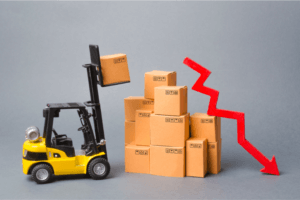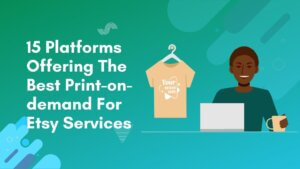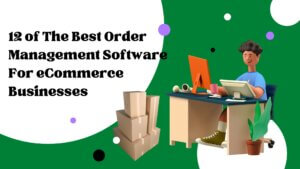Yes, you can private-label just about any product you can imagine.
A Google Featured Snippet from eCommerce CEO, one of the most well-known sources of hype-free eCommerce business advice, echoes this sentiment by noting that it is possible to private label virtually any product in any niche.
Today’s post aims to help you understand why it is possible to private label virtually anything.
Let’s start our discussion by looking at how the private labeling business works and some salient features that make it possible to private label virtually anything.
目录
How the Private Label Business Model Works: The Key Features that Make it Possible to Private Label Anything
As mentioned, you can private-label virtually any product. Let’s look at the key features of the private label business model that make this possible:
How the private label business model works
A private label product is “a product produced by one manufacturer but sold under a retailer’s brand name.”
For example, in this business model, manufacturer X and retailer Y can work together to develop a unique shampoo formula that the manufacturer produces for retailer X to sell under their brand –often using customized packaging.
A private label product is not generic or available for sale by multiple retailers –that’s white labeling. Instead, retailers collaborate with third-party manufacturers to custom-produce products for their brand, including changing the packaging, formula, product specifications, etc.
This straightforward business model makes it possible to private label virtually anything.
Having looked at what the private label business model is and how it works, let’s turn our attention to the core advantages of the private label business model that make it possible to private label anything:
Private labeling: The Pros
Private labeling has some outstanding advantages that make it a fantastic business model that allows you to private label anything. The plainest of these advantages are:
- #: Production control
Courtesy: Transweb Global Inc, via Slideshare
Most private labeling-friendly manufacturers allow retailers to customize most aspects of the production process –most third-party manufacturers call this all-in-one private labeling.
This all-in-one private labeling service gives private label retailers control over the production process. It makes it possible for retailers to customize every step of the manufacturing and private labeling process, including the source material, ingredients used, product quality and production rate, and even packaging and branding options.
Because private label retailers have production control, it is possible to private label any product as there’s a third-party manufacturing partner who can produce it.
NOTE: It’s important to point out here that third-party manufacturers who offer private labeling services specialize in one niche or product –or a related line of products. For example, one third-party manufacturer may specialize in private labeling all types of cosmetics, while another specializes in private labeling Gym clothes.
Thus, depending on which product you want to private label, you will need to find a third-party manufacturer who offers that product–or product line–for private labeling.
Talking of the all-in-one services offered by third-party manufacturers:
- #: All-in-one services
As mentioned, most third-party manufacturers offer all-in-one services. These services make it possible to private label virtually anything and are one of the core advantages of private labeling.
Take this, for example:
Let’s say you want a line of private labeled dog treats –that’s as fringe a private labeled product as you can get:
Working with a third-party manufacturer who offers all-in-one services, you can customize every aspect of your product, including specifying the ingredients -perhaps you want vegan-friendly dog treats– the formula, the size and shape of the treats, etc.
These all-in-one services are usually so well-developed and adaptable to retailers of all sizes that, depending on the product at hand, contract manufacturers can even help retailers with R&D, prototyping, and so much more.
This makes it possible to private label anything –but you have to find a third-party manufacturer specializing in that niche. Some third-party manufacturers who have well-kitted out production units are willing to go as far as accommodating retailers who want custom products made.
- #: Exclusivity
While this advantage does not explicitly relate to private labeling anything, it’s worth mentioning because it’s one of the core ideas that make private labeling such a powerful business model.
When retailers work with third-party manufacturers to produce privately labeled products, the private label is exclusive to that retailer. The third-party manufacturer is bound by contract law not to share the “formula” or “product design” with other retailers –which is what white labeling is.
Beyond giving you a competitive advantage, this exclusivity also means you can create as-unique-a-product as you want and sell it exclusively.
These three reasons clearly illustrate why it’s possible to private label anything or any product. Beyond these three core factors, the private label business model has other advantages that make it worth your while. They include:
- Lower overhead costs –Low overhead costs are because, as a retailer, you do not need to handle the manufacturing process. Instead, you outsource it to a third-party manufacturer who manufactures a product to your specifications.
- Pricing and branding control: As you can imagine, unlike generic, white label products, because your private label is unique to your retail brand, you control the supply chain and can set product prices for the best profitability. Additionally, you can customize the packaging and branding of the privately-labeled product to match your retail brand for better brand loyalty –Amazon Basics is a prime example of this.
Courtesy: Digital Commerce 360
- Better focus on growth: As discussed, private label retailers do not handle manufacturing. Additionally, some third-party or contract manufacturers are so private-label-friendly that they even offer retailers dropshipping services –you can also use a 3PL fulfillment agency like Bestfulfill if you don’t want to handle fulfillment and logistics. This “All-in-one” nature of the business model means retail brands can focus more on growth aspects –branding, marketing, customer service, etc.– thus making it easier to grow a private labeled business brand.
Now you know the inherent private label business model advantages that make it possible to private label anything. However:
Like most business models, private labeling also has some core disadvantages every retailer should know.
Private labeling: The Cons
The most notable private labeling cons are:
- Higher startup costs: While you can private-label anything, it’s worth noting that, because most third-party manufacturers ask for upfront down payments, private labeling has higher startup costs than, say, white labeling or dropshipping. This factor can disenfranchise small retailers who don’t have boatloads of cash flow at their disposal.
- Minimum order quantities and inventory rules: Most third-party manufacturers offering private labeling services usually have minimum order requirements and set out inventory rules. For example, a private labeler may ask retailers to order a specific number of products over X period –perhaps every month– to keep the production feasible. These minimum order requirements and inventory rules can be restrictive, especially when they are too high to be viable, leading to dead inventory and losses.
Given these cons, it’s important to know when private labeling can work for you as a retailer:
Private labeling Works Best When:
- You want to create a custom brand product
- You can dedicate time and resources to research and development, even when your preferred third-party manufacturer offers end-to-end third party manufacturing that includes product design
- You have designed a unique-to-your-brand product and are just looking for a manufacturer who’ll handle the production
- Your designed product is superior to or unique from any other white label product in the market
- You have plans to set up an in-house manufacturing process in the future and would like to learn as much as possible about manufacturing your branded products before then
- You have low volume demands, and it doesn’t make sense to set up a production unit for your private label brand
With that out of the way, let’s look at:
Key Things To Keep In Mind When Deciding What to Private Label
Although you can private-label anything, it’s critical that before you ideate and settle on a product for private labeling, you keep the following in mind:
- Conduct thorough product and market research to determine what to sell: While you can private-label anything, you shouldn’t –not before conducting thorough market, product, and audience research. Ideally, you want to go with a popular product that aligns with your interest and is not too saturated in the market. You can use tools like Google Trends, Google Keywords, Ubersuggest, premium keyword/market research tools, and platforms like Amazon’s Bestseller list for market, product, and audience research.
- Favor evergreen niche products: Although you could private-label anything, remember that, while it is important to create a unique, differentiable product, you should favor evergreen products and differentiate yourself in that niche. This product research approach poises you to make more money, especially if you have a unique product, over the long-term –because evergreen products have the sales volumes to boot.
- Go for products that solve a problem or challenge: Whether you’re a small or nationwide retailer, remember that the products that perform well over time are those that solve a consumer need. If you can solve a need and differentiate your product(s) from the competition, your chances of success as a private label retailer are better.
- A passionate audience: Products that have a passionate audience frequently out-perform most other products –even evergreen ones– because impassioned audiences are loyal to a tee once they find a good product they like. P.S: Talking of passion, private label products that align –even if it’s to some degree– with your passions because passion will motivate you to keep marketing your products before the sales floodgates open.
- Brandable products: Private label brands often fail to do well because of consumer perception and distrust. That’s why you want to private label brandable products: products for which you can create an impactful brand message that resonates well with the audience. This gives your branded products a unique voice in the market, making it easier for consumers to recognize your brand products and identify with them, especially when those products solve a need or problem in their lives.
Now you know what to look for in a possibly-profitable private label product. Finding a contract or third-party manufacturer is part and parcel of the private labeling business. That’s why you need to be very mindful of the process and do it correctly.
Top Tips For Choosing A Private Label Manufacturer
Here are some important tips to keep in mind when choosing a private label manufacturer:
- Clearly define what you want: Remember that most private label manufacturers specialize in a specific product category. Thus, defining your exact needs will make it easier to narrow down your list and find a private label manufacturer who can meet your requirements and create the product you want to your exact specification.
- Capability: Only work with a third-party manufacturer who can maintain consistent production. You don’t want to work with a private label manufacturer who, after getting your branded products to market and marketing them to viral popularity, fails to meet your production needs, prompting you to look for another manufacturer.
- Quality above everything: Quality is not something you should willingly compromise. High-quality brands/products create loyal customers and brand ambassadors. If you work with a private labeler who compromises quality, you’ll cripple your business.
- Regulatory compliance: It’s important that you only work with private label manufacturers who fulfill all regulatory requirements in their base country —and your target marketing locations. Know all the compliance standards for the products you want to market and only work with a third-party manufacturer who meets these standards. For example, ensure that your chosen white or private labeler has ethical sourcing processes and adheres to industry and country-specific standards.
- Consider MOQs: Private label manufacturers usually have minimum order quantities, the minimum units of one product you can purchase; some manufacturers have high, while others have low minimum order quantities. Before settling on a specific white or private label manufacturer, inquire about MOQs to ensure you have the budget to match. Ideally, work with a label manufacturer who doesn’t have unmanageable MOQs.
- Ask about all label fees: White and private label manufacturers have varying label fees terms. For example, some will ask you to pay label fees for each order, while others will only need you to pay one-off label fees for a minimum order quantity batch. Asking about label fees beforehand will make you more aware of how much you’ll pay in label fees for each order, which will help you avoid hidden costs and price your products accordingly to remain profitable.
Alibaba, SupplyMeDirect, AliExpress, Wholesale2b, and Worldwide Brands are prime examples of great places to find private label manufacturers.
Because the private labeling process is also very involved, you might want to work with a professional drop shipping sourcing and fulfillment agent like Bestfulfill.
Beyond private labeling, professional dropshipping sourcing and fulfillment agents like Bestfulfill offer other vital services, like product inspection, branded packaging, gift and thank you cards, and dropshipping order fulfillment, all of which make running a private label successfully easier.
Conclusion
Yes, you can private label anything. You only have to research and understand your market, then find a reliable private labeler or contract manufacturer specializing in the product you want to private-label or who is willing to accommodate your private label needs.



